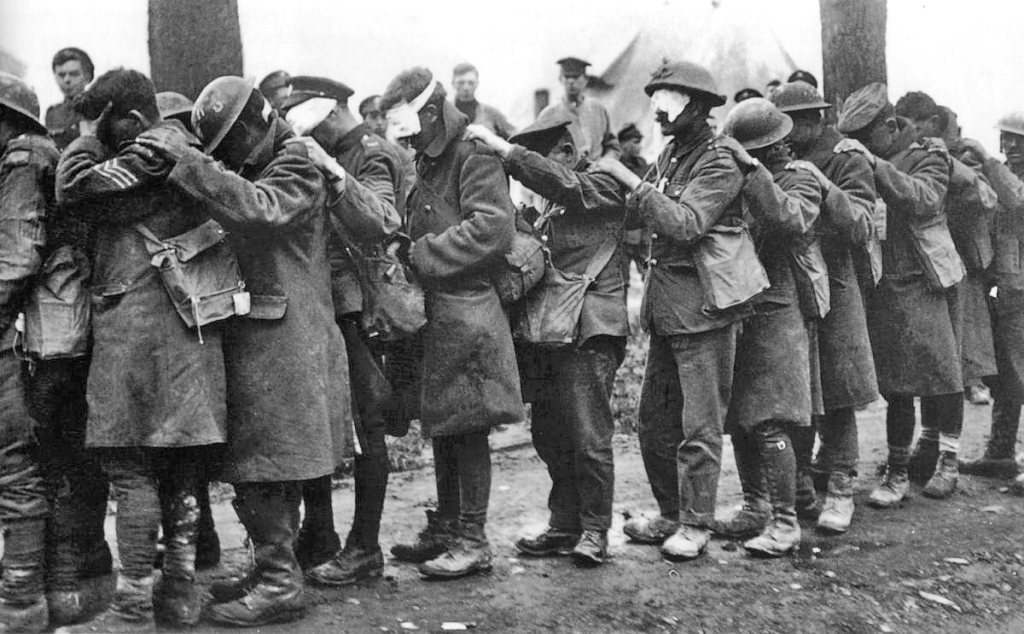Arming all sides: how arms companies fuelled the great war

World War One was an immoral war that led to an unparalleled level of death and destruction. By the end, 16 million people had been killed and 20 million wounded in a conflict that devastated and destroyed whole cities and communities. Civilians and soldiers, often from poor backgrounds, paid the price for a terrible war brought on by the rich and powerful rulers of competing imperialist powers.
Very few benefited from the conflict. It did however line the pockets of arms companies and their shareholders. As the Arming All Sides project by Campaign Against Arms Trade and On the Record makes clear, the appalling conduct of these companies was instrumental in both fuelling the drive to war and shaping the conflict.
World War One was the first global conflict since the industrial revolution and the new generation of mechanised arms led to devastating casualties. Attempts had been made to ban Chemical Warfare as early as 1899, but the arms trade persevered, and gas killed 25,000 on the Western front alone.

The international tensions created new business opportunities for arms companies who were happy to purposely exaggerate and in some cases create war scares with the aim of increasing the arms race.
One example of this is Herbert Mulliner, the Director of Coventry Ordnance Works, who in 1909, with the support of the Daily Mail, persuaded the British government that Germany was secretly accelerating its naval programme. The scare stimulated massive naval expenditure and created an atmosphere of mutual suspicion, making war more likely. Even Winston Churchill later accepted that the claims were entirely false.
Arms dealers interests were protected thanks to the intimate relationship they often had with politicians. In 1914 one Labour MP, Philip Snowden, told the House of Commons that with so many MPs being shareholders of arms companies, ‘it is not possible to throw a stone at the benches opposite without hitting one.’
The arms companies also didn’t care who they sold their weapons to. As the march to war continued, their drive for profits at all costs even led UK arms companies, Armstrong and Vickers – which later merged to become BAE – to sell weapons to the Ottoman Empire that would soon be turned on British soldiers in the disastrous Gallipoli campaign.
The human cost of war should never be forgotten, and that is why the arms trade needs to be reminded time and time again about the terrible crimes that it directly supported and facilitated.
The arms trade today

After the First World War many rightly believed the arms trade to be a primary cause of war. The unprecedented scale of death and destruction wrought by modern weaponry led a majority of people to support disarmament and international conciliation. The scale of opposition was seen with nationwide events, such as the Peace Ballot, in which over 10 million people registered their opposition to the arms trade.
Unfortunately the fundamentals of the arms trade are unchanged since then. Arms companies still exist to sell weapons, irrespective of of national boundaries, and selling to all sides in a conflict has not abated since the First World War. The conflict in Libya is a case in point. It saw arms from one company, MBDA, being used by Gaddafi’s forces, the Libyan rebels and the UK and French military.
The close relationship and revolving door between the industry and government is also still dominant today as politicians often become managers for arms companies when they leave politics. One of the most striking examples of recent years is that of Sir Sherard Cowper-Coles, who, as Britain’s Ambassador to Saudi Arabia, pressured the Serious Fraud Office to drop its investigation into BAE-Saudi arms deals. On leaving the Foreign Office he was given a job with BAE Systems.
Those of us that seek to challenge the arms trade and its militaristic mindset today need to continue countering the same myths that arms companies are a ‘necessary evil’ and act in the national interest. Focusing on and exposing their profiteering conduct a century ago and drawing the parallels with today is essential when responding to those that are trying to teach the wrong lessons from the First World War today.
You can follow the Campaign Against the Arms Trade on Twitter at @wwwcaatorguk.




Leave a Reply